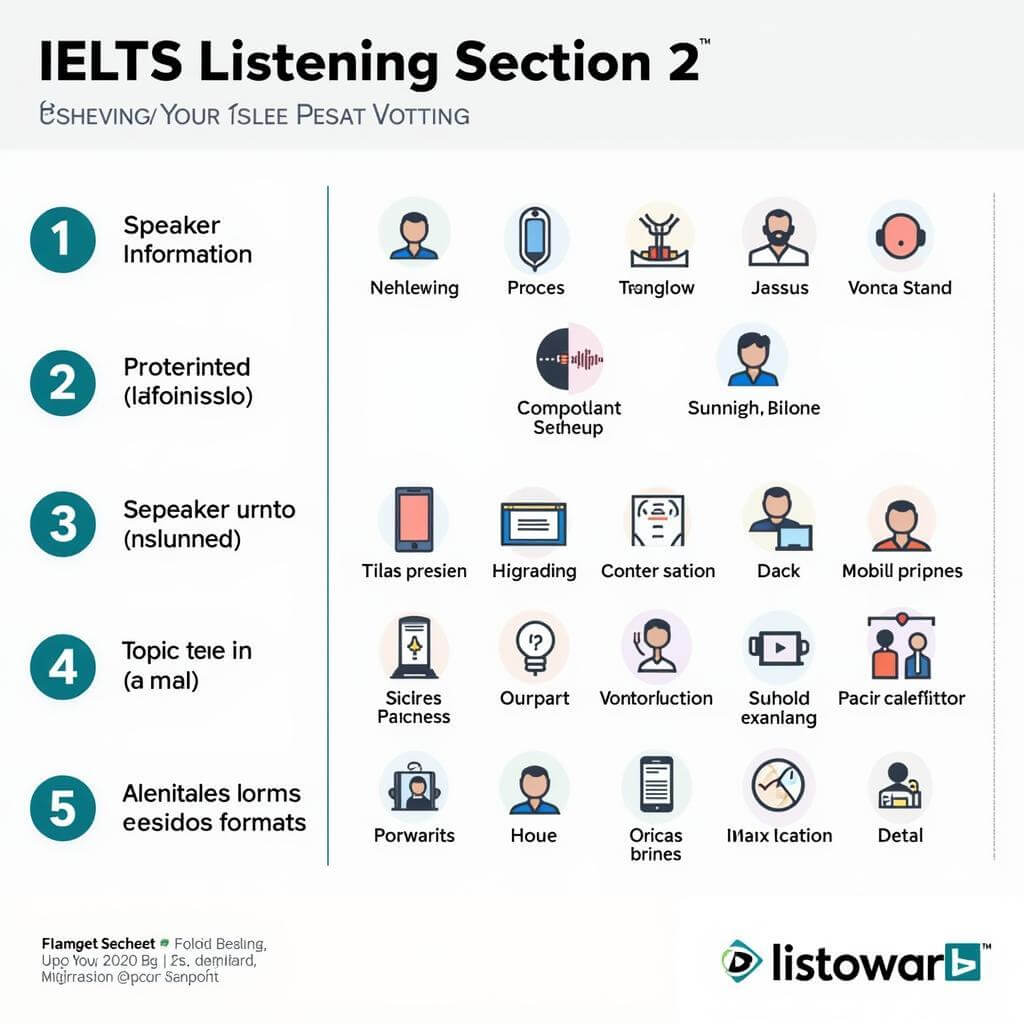IELTS Listening Section 2 often presents unique challenges for test-takers. This monologue-style segment requires focused attention and specific strategies for improving performance in IELTS listening section 2. As an experienced IELTS instructor, I’ll share valuable insights to help you excel in this crucial part of the exam.
Understanding the Nature of IELTS Listening Section 2
Section 2 typically features a monologue on a general topic, often related to everyday situations or local facilities. Understanding its structure is key to developing effective strategies for improving performance in IELTS listening section 2.
Key Characteristics:
- Duration: Approximately 3-4 minutes
- Speaker: Usually one person (occasionally two)
- Topic: General interest, often about local facilities or services
- Question Types: Various, including multiple choice, map/plan labelling, and form completion

Essential Strategies for Excelling in Section 2
-
Predict the Content
- Read the questions before the audio begins
- Anticipate the topic and possible vocabulary
- Visualize the scenario to engage your mind
-
Focus on Signposting Language
- Listen for transitional phrases like “firstly,” “next,” “finally”
- These words often indicate important information is coming
-
Practice Active Listening
- Engage with the content mentally
- Visualize the information being described
- Boosting retention during listening is crucial for success
-
Develop Effective Note-taking Skills
- Use abbreviations and symbols
- Focus on key information, not every word
- Practice note-taking with various monologue recordings
-
Improve Your Concentration
- Build stamina through regular practice sessions
- Minimize distractions during your study time
- Train yourself to focus for the full duration of Section 2
“The key to mastering IELTS Listening Section 2 is to approach it with a strategic mindset. Prediction, active engagement, and focused note-taking are your best tools,” advises Dr. Emma Thompson, IELTS Expert at Cambridge University.
Dealing with Specific Question Types
Multiple Choice Questions
- Read all options carefully before listening
- Be aware of distractors (similar-sounding options)
- Listen for synonyms or paraphrases of the options in the audio
Map/Plan Labelling
- Study the map or plan thoroughly before the audio begins
- Familiarize yourself with compass directions and spatial prepositions
- Listen for specific location descriptions
Form Completion
- Preview the form to understand its structure
- Pay attention to word limits in the instructions
- Listen for exact words or synonyms to fill in the blanks
Advanced Techniques for High Scores
-
Anticipate Paraphrasing
- The audio rarely uses exact words from the questions
- Train your ear to recognize synonyms and alternative expressions
- Recognizing shifts in speaker focus can help you catch paraphrased information
-
Master Time Management
- Allocate your attention wisely between listening and writing
- Practice transferring answers quickly and accurately
- Use any silent periods to review your answers
-
Enhance Your Vocabulary
- Study vocabulary related to common Section 2 topics
- Learn idiomatic expressions often used in everyday conversations
- Familiarize yourself with different accents and regional terms
-
Develop Sound Discrimination Skills
- Practice distinguishing between similar-sounding words
- Pay attention to contextual clues to confirm your understanding
- Strategies for dealing with fast speakers in IELTS listening can be particularly helpful here
-
Utilize Mock Tests Effectively
- Regularly take full-length practice tests under exam conditions
- Analyze your performance to identify patterns in your mistakes
- Focus your practice on areas that need improvement
Dr. Michael Chen, IELTS Examiner and Trainer, emphasizes, “Consistent practice with a variety of monologue recordings is crucial. Expose yourself to different accents and speaking speeds to build confidence and adaptability.”
Common Pitfalls to Avoid
-
Fixating on Missed Answers
- Don’t dwell on questions you’re unsure about
- Move on quickly to avoid missing subsequent information
-
Neglecting Context
- Pay attention to the overall context of the monologue
- Use contextual clues to infer meanings of unfamiliar words
-
Overlooking Instructions
- Carefully read and follow all instructions
- Be mindful of word limits and answer formats
-
Lack of Concentration
- Maintain focus throughout the entire section
- Practice mindfulness techniques to improve concentration
-
Insufficient Practice with Monologues
- Regularly listen to and analyze monologue-style recordings
- Familiarize yourself with the pacing and structure of Section 2
Conclusion
Mastering strategies for improving performance in IELTS listening section 2 requires dedication and targeted practice. By understanding the section’s structure, developing key skills like prediction and active listening, and avoiding common pitfalls, you can significantly enhance your performance. Remember, consistent practice and application of these strategies are crucial for success. Keep refining your approach, and you’ll be well-prepared to tackle Section 2 with confidence on test day.
FAQs about IELTS Listening Section 2
-
How long is IELTS Listening Section 2?
Section 2 typically lasts about 3-4 minutes. -
What types of topics are common in Section 2?
Common topics include local facilities, services, events, or general interest subjects related to everyday life. -
Can I write on the question paper during the listening test?
Yes, you can make notes on the question paper, but your final answers must be transferred to the answer sheet. -
How can I improve my note-taking skills for Section 2?
Practice summarizing information quickly, use abbreviations, and focus on key points rather than trying to write everything down. -
Is it important to read the questions before the audio starts?
Yes, it’s crucial. This helps you predict the content and focus your listening on relevant information. -
How can I deal with unfamiliar accents in Section 2?
Regularly expose yourself to various English accents through podcasts, news broadcasts, and practice materials. How to improve retention of spoken information for IELTS listening can also be helpful in this regard. -
What should I do if I miss an answer in Section 2?
Don’t panic. Move on to the next question to avoid missing more information. You can always come back to it if there’s time at the end.